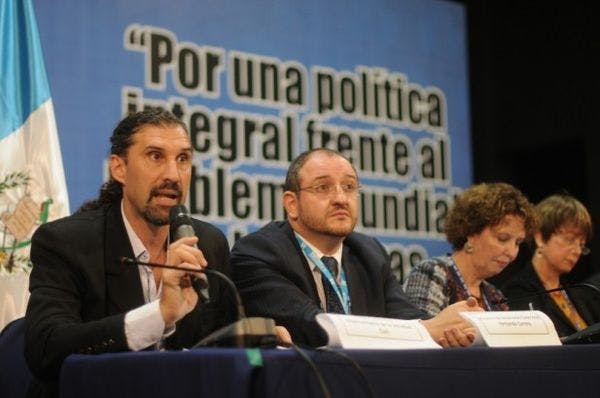Drug policy and human rights groups unite in support of drug policy reform at the OAS
Civil society organizations played a particularly important role at this year’s forty-third regular session of the General Assembly meeting of the Organization of American States (OAS), which took place in Antigua, Guatemala from June 4 to 6, 2013. The annual meeting brings together the hemisphere’s foreign ministers, hundreds of official delegates and civil society representatives from around the hemisphere. While the private debate among government officials focused almost exclusively on the key unresolved point in the final declaration to be released at the end of the meeting, “For a Comprehensive Policy Against the World Drug Problem in the Americas” – whether or not to hold a Special Session of the General Assembly focused on drug policy issues – a diverse group of civil society representatives debated a range of issues grouped into three categories: challenges to public health, to public security, and to democracy and access to justice. Together, they drafted a declaration that was presented in a dialogue with heads of delegation and the OAS Secretary General and Assistant Secretary General. In addition to representatives of civil society, labor unions, the private sector and other social actors also participated.
In past OAS General Assembly meetings, civil society efforts have been thwarted by disagreements and internal divisions. The process itself is somewhat messy, given the range of actors and interests represented. Nonetheless, the drug policy section of the final civil society declaration lays out a range of alternative policies based on principles of public health, harm reduction, and human rights. It calls for decriminalization of consumption, proportionality in sentencing and experimentation with drug regulation models, beginning with cannabis, among many other recommendations. As with the UN-based civil society effort, Beyond 2008, civil society organizations showed their ability to work constructively and overcome internal divisions based on common objectives in seeking more effective and rights-based drug policies. In addition, thanks to a campaign launched by Avaaz, citizens from across the region were also given an opportunity to have their voices heard in Antigua. Avaaz representative Pedro Vieira Abramovay presented a petition to Guatemalan President Otto Pérez Molina signed by over 200,000 individuals from across the Americas urging the OAS to back a “radical new approach to drug policy.”
Of particular note, a synergy developed between human rights groups and drug policy-oriented groups. The human rights groups began the section on the promotion and protection of human rights in the final civil society declaration with twelve points on the linkages between drug policy and human rights. A Letter to the Presidents on that topic was signed by 50 human rights and drug policy groups, highlighting the urgency of putting human rights protection at the center of the drug policy debate in the Americas. More than 160 civil society organizations from Mexico, Honduras, Guatemala, El Salvador, Nicaragua and the United States, sent an open letter to the OAS General Assembly calling for alternatives to the “war on drugs” that guarantee respect for human rights. And of particular significance, Human Rights Watch released a statement calling for the decriminalization of personal use of drugs and for interpreting the conventions, and where necessary, revising them, to ensure that governments are not discouraged from adopting policies to reduce the human toll of the current approach. The challenge now is for the human rights and drug policy NGO communities to deepen the collaboration that was initiated in Antigua.
